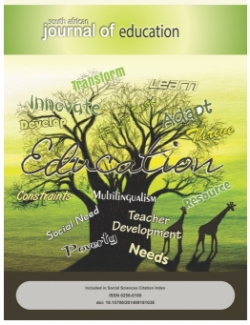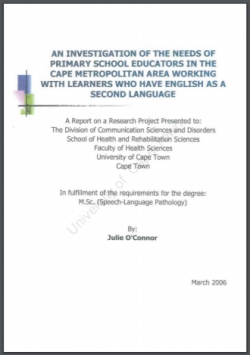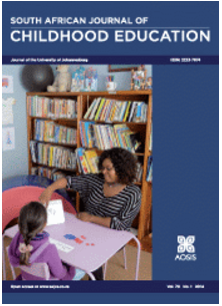Promoting spiritual well-being of children: experiences and perceptions of primary school educators

Type
Thesis
Authors
Category
ECCE, Foundation, Intermediate
[ Browse Items ]
Publication Year
2016
Publisher
North West University, Potchefstroom, South Africa
URL
[ private ]
Pages
79 p.
Subject
Early childhood development, Primary education, Children’s spirituality, Educators’ experiences, Health promoting schools, Inclusive education, Spiritual well-being, Well-being, South Africa
Abstract
Increasingly, spirituality and spiritual well-being (SWB) are featuring as topics for discussion and research in the fields of psychology, education, health care and social development (Karstens,2010; Tacey, 2004). A central question in current literature and debate about spirituality is ‘what does it mean’? While Zhang (2010) describes spirituality as an inherent aspect of being human, current literature tends towards describing inclusive definitions that allow for a range of spiritualities, from the existential to the religious (Egan, 2011). In this research study, the universal concept of spirituality was adopted. This concept describes spirituality as the search for meaning, relationships, connectedness, unity and transcendence which is independent of a religious framework (Jacobs, Viljoen and Van der Walt, 2012; Emmons, 1999). Considering that the well-being of children in urban areas, world-wide, is being affected by the results of globalisation and demographic changes (Rees, Francis & Robbins, 2005), there is increasing global interest in the impact of spirituality on children’s overall well-being, and specifically in the education context (Karstens, 2010). Hyde (2005) proposes that the primary school classroom is a place where appropriate spaces can be created for nurturing children’s spirituality with the aim of promoting their SWB. With this in mind, the researcher asks the question, What perceptions and experiences do educators have of promoting primary school children’s spirituality and spiritual well-being? The aim of this research was therefore to explore and describe the perceptions and experiences of primary school educators regarding the promotion of children’s SWB. This research study followed the format of a qualitative design, originating from an interpretative approach, and aimed to understand the meaning that primary school educators attach to experiences of their work with children. More specifically, in order to give voice to the educators’ perceptions and experiences regarding promoting children’s SBW, semi-structured interviews with primary school educators were utilized. The results of the empirical research and the literature review indicated that there are a variety of descriptions for spirituality and that it means different things to different people. The dominant perception among the educators is that spirituality is an important aspect of life. Educators’ perceptions of spirituality ranged from religious to humanistic/existentialist and can be classified as following the inclusive approach to spirituality. The educators’ responses on the question about their experiences of promoting SWB centred on their relationship-building with children and their responsibility of being role-models for children. Aspects of the school curriculum as well as co-curricular programmes were identified facilitators of the process of promoting the SWB of children. In addition limited support from parents and a busy school timetable were mentioned as a challenge to the process, along with the sometimes overwhelming range of responsibilities that educators are expected to fulfil. It is therefore concluded that primary school educators perceive themselves as being engaged in the promotion of children’s SWB, along with the support of the school as a whole. In addition, educators perceive a need for improvement in the level of co-operation between parents and educators, in this process, and a possible revision of the structure of the school timetable and curriculum, to assist in their efforts to promote the SWB of children.
Number of Copies
1
| Library | Accession No | Call No | Copy No | Edition | Location | Availability |
|---|---|---|---|---|---|---|
| 1 | Potchefstroom, North West Province, South Africa | Yes |



